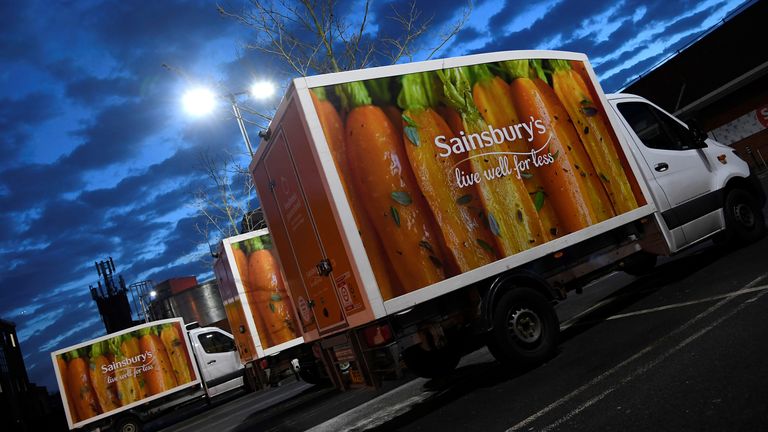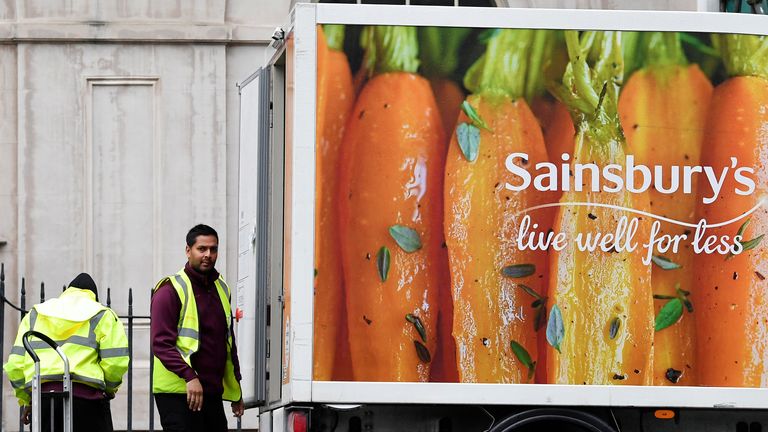ARTICLE AD BOX
Pity the 3,000 Sainsbury's employees whose roles are set to be eliminated because of today's big jobs announcement from the UK's number two supermarket retailer.
Not only are they potentially going to lose their jobs, just as the bills from Christmas are rolling in, but they also now face becoming a political football in an unedifying debate.
For it is almost inevitable that Rachel Reeves's political rivals are going to cite the chancellor's Halloween budget as the main reason why these roles are being removed.
They will point out that, just days after the chancellor hit businesses with a hike in employer's national insurance contributions (NICs), Sainsbury's was among the first of the big-name employers to warn of the potential consequences.
Simon Roberts, the Sainsbury's chief executive, said: "There will be difficult decisions to take as a result."
They will further point out that, earlier this month while unveiling the company's Christmas trading update, Mr Roberts repeated that warning and said the way the increase was announced gave businesses insufficient time to prepare for the hike in taxes.
However, before the chancellor's critics get too carried away, it is worth remembering that Mr Roberts and his peers at employers like Tesco, Next and Marks & Spencer were chiefly warning that the rise in NICs would be inflationary and lead to higher shop prices.
Rather less was said explicitly about job losses.
The wider business context
These job losses must be seen in the wider context of how Mr Roberts is reshaping Sainsbury's.
Profit margins in the grocery sector are wafer-thin and, with the traditional big four of Tesco, Sainsbury's, Asda and Morrisons all running campaigns to price match Aldi, that means being as efficient as possible and keeping operating costs down.
Money blog: Could Santander really walk away from UK?
It was as long ago as November 2020, at the height of the pandemic, that Mr Roberts announced plans to cut 3,500 jobs as part of a move to close permanently the supermarket's meat, fish and deli counters.
There have been regular waves of job reductions ever since, most notably in February 2023, when 1,400 roles were put at risk with the closure of two Argos warehouses. A further 1,500 jobs were put at risk in February last year when Sainsbury's announced plans to close in-store bakeries and a call centre.
That same month, Mr Roberts announced plans to reduce costs by £1bn over the next three years at a strategy update in which he declared that the grocer would be focusing on "food first".

Noting that just 15% of Sainsbury's supermarkets offered its full range of food products - some 30,000 individual lines - he said Sainsbury's would be devoting less floor space in the company's biggest supermarkets to general merchandise and clothing and devoting more of it to selling groceries.
With Sainsbury's also closing more stand-alone Argos outlets, it did not take much of a leap of imagination to work out that the company's remaining in-store cafes were an obvious target to cull. The company, notably, did not rule out job losses at the time.
So today's news has to be seen in the context of what Sainsbury's has been doing for nearly five years.
Rachel Reeves not absolved of blame
That is not to say Ms Reeves's budget should be completely absolved of blame for these job losses.
Sainsbury's, like other retailers, is facing a huge increase in costs as a result not only of the increase in the rate at which employer's NICs are levied but also, crucially, in the chancellor's lowering of the threshold at which they kick in from £9,100 to £5,000.
Read more:
Primark sales woes underline the challenges facing retail
Barclays to slash CEO's fixed pay as package capped at £14m
That is going to make it more costly, in particular, to employ the kinds of part-time workers - mainly women - that retailers rely on.
It is no surprise to see job cuts as a consequence of both this and the coming rise in the national living wage. These measures, along with a rise in business rates, are estimated to be adding £7bn in costs for the retail sector this year.

Retailers are responding by accelerating cost reduction plans.
To that end, the response of the Unite union to these job losses felt like a denial of reality.
The experience of the last decade, during which Aldi and Lidl have won an increased share of the UK grocery market at the expense of some incumbents, has shown there is a sizeable element of the UK population - presumably many of them Unite members - who respond positively to ultra-low prices.
What are Sainsbury's and its competitors supposed to do in response - stand idly by?
Further cuts to come
Unite says that Sainsbury's has been "profiteering" on the backs of its workers. Perhaps the union should have been listening harder to what Ms Reeves and her ministerial colleagues have been saying this week in Davos as they have sought to drum up interest in Britain as an investment destination.
Investors will only deploy capital where they can be sure of making a return on their investment that exceeds their cost of capital.
It is therefore entirely reasonable of Sainsbury's, when confronted with a higher tax bill, to seek to protect its returns by cutting costs.
Expect other retailers to announce similar cost-reduction programmes in the weeks and months ahead.

 8 hours ago
1
8 hours ago
1








 English (US)
English (US)